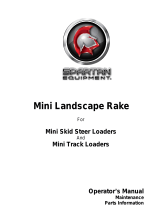Wear Protective Equipment
►Escaping fluid under pressure can penetrate the skin causing serious injury.
►Avoid the hazard by relieving pressure before disconnecting hydraulic lines
or performing work on the system.
►Make sure all hydraulic fluid connections are tight and all hydraulic hoses
and lines are in good condition before applying pressure to the system.
►Use a piece of paper or cardboard, NOT BODY PARTS to check for
suspected leaks.
►Wear protective gloves and safety glasses or goggles when working with
hydraulic systems.
►DO NOT DELAY. If an accident occurs, see a doctor familiar with this type of
injury immediately. Any fluid injected into the skin or eyes must be treated
within a few hours or gangrene may result.
Transportation and Storing
►Store machine and fuel where fuel vapors cannot reach sour combustion
like, water heaters, electric motors, switches, furnaces, etc.
►Always secure the machine with tie downs or similar restraints when
transporting.
►The machine be stored in a manner that prevents it from falling, rolling or
tipping.
►Tighten loose nuts, capscrews and hydraulic connections.
►Coat exposed portions of the cylinder rods with grease.
►Lubricate grease fittings.
►Seal hydraulic system from contaminants and secure all hydraulic hoses off
the ground to help prevent
damage.
►Store unit in a dry and protected place. Leaving the unit outside will
materially shorten its life.















